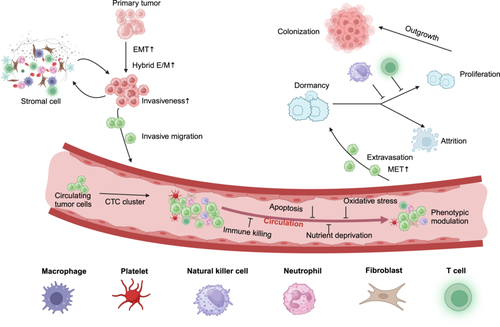MedComm-Oncology | Tumor Metastasis: Mechanistic Insights and Therapeutic Intervention

Open the phone and scan

Phases of metastasis. Through the process of epithelial–mesenchymal transition (EMT) and interaction with stromal cells, primary tumor cells become more invasive and invade the vasculature or lymphatic vessels to become circulating tumor cells (CTCs). Under various environmental stresses, only a small fraction of CTCs undergo phenotypic modulation and are able to extravasate to distal organs to become DTCs and enter into a dormant state. Over time, DTCs will adapt and take advantage of tumor-microenvironment (TME) for colonization. E/M, epithelial/mesenchymal.
Metastasis remains a leading cause of cancer-related deaths, defined by a complex, multi-step process in which tumor cells spread and form secondary growths in distant tissues. Despite substantial progress in understanding metastasis, the molecular mechanisms driving this process and the development of effective therapies remain incompletely understood. Elucidating the molecular pathways governing metastasis is essential for the discovery of innovative therapeutic targets. The rapid advancements in sequencing technologies and the expansion of biological databases have significantly deepened our understanding of the molecular drivers of metastasis and associated drug resistance. This review focuses on the molecular drivers of metastasis, particularly the roles of genetic mutations, epigenetic changes, and post-translational modifications in metastasis progression. We also examine how the tumor microenvironment influences metastatic behavior and explore emerging therapeutic strategies, including targeted therapies and immunotherapies. Finally, we discuss future research directions, stressing the importance of novel treatment approaches and personalized strategies to overcome metastasis and improve patient outcomes. By integrating contemporary insights into the molecular basis of metastasis and therapeutic innovation, this review provides a comprehensive framework to guide future research and clinical advancements in metastatic cancer.
Article Access: https://doi.org/10.1002/mog2.70012
More about MedComm-Oncology: https://onlinelibrary.wiley.com/journal/27696448
Looking forward to your contributions.


